- Home
- Michael Grant
BZRK: Apocalypse Page 17
BZRK: Apocalypse Read online
Page 17
“I’m afraid I will have to lock you up, Dr. Babbington. I’m sure there’s a tool locker somewhere. They’ll find you when the party is over and when the weather clears. Do you have to use the bathroom? Because you’ll be tied up for as much as a day.”
Amazing, Suarez thought, how quickly life can get weird. One minute you’re driving an LCAC delivering oranges and booze and hauling away garbage, and the next minute you’re beating up scientists and preparing to get yourself killed in some dry valley at the end of the world.
She had no doubt that this Lystra Reid person was capable of killing. You don’t set out to build secret bases defended by sophisticated weapons because you’re peaceable by nature.
But the question in her mind was whether this whole thing, whatever was going on here, was a secret government op unknown to Tanner. Tanner was low-level; this could simply be something way above his pay grade. In which case she would earn no thanks for barging in on this third base unannounced.
But they wouldn’t kill her, not if this was a government op. They’d give her a stern lecture, make her sign more threatening letters, and just maybe hire her on.
If, on the other hand, it wasn’t a government op but some actual crazy woman buying missiles and building a secret lair at the frozen anus of planet Earth, well …
She had to tell someone what was up: a witness she could trust to follow up just in case Imelda Suarez was never heard from again. She glanced at the computer on a work desk.
“User password on that computer?” she asked, sliding into a chair.
Babbington shrugged. “1234ABC.”
“Seriously?” She typed it in and got access to her own e-mail account. She wrote a message to her brother, Frank. Frank was with the Capitol Police. He wouldn’t be cleared for this information, but she knew she could trust him.
She spent a few minutes locating a good, strong steel tool locker and pushed Babbington and a bottle of water inside.
“You okay in there?”
“Well …”
“You’ll be fine.”
Then: the sleigh.
Suarez was honest enough to admit that she was motivated in part by an almost lustful desire to drive the sleigh. It was an object of beauty. A work of art. It screamed “speed” just sitting there.
She shed her parka, stuffed it into the very minimal storage space behind the cockpit seat, and slid into the leather chair. The pedals were where they should be. The yoke was awkwardly placed by her lights, but she could live with it. The displays were elegant and wonderfully easy to read.
She closed the canopy and realized the hangar doors were shut. So she climbed back out, scrounged around until she found a remote control, and climbed back in. It was just as good the second time. She had to fight the urge to run her fingers over the displays. Beautiful. If Rolls-Royce, Tesla, and Porsche teamed up to make a hovercraft, this would be it.
There was an autopilot, but she couldn’t imagine trusting herself to a computer—not at the speeds this thing moved, not on the most treacherous terrain on planet Earth. But she turned on the automated warnings as well as, after some hesitation, the impact-avoidance system that would take control if she was in immediate danger of crashing.
“You wreck this thing and your future will be very much in doubt, Imelda,” she told herself.
Then, finally, she fired up the engines.
It was noisy but not deafening in the cockpit. She felt the surge of suppressed power as the twin jets throbbed. The sleigh rose on a cushion of air.
She keyed the remote, and the hangar doors slid open. Beyond the doors was whiteness, white on white as far as the eye could see.
She punched her destination into the GPS, released the cable tie-downs, and slid toward the gap at walking speed then running speed and was just hitting fifty knots by the time she blew out of the building, keyed the doors over her shoulder, and rocketed out onto the ice.
Oh, yes.
She smiled and held it at fifty knots until she had played with the controls for a while and come grudgingly to trust the forward-scanning radar.
The ice here was rippled but with no rises over eighteen inches. The sleigh’s jets adjusted automatically to push more air into the cushion as she reached obstacles.
Very soon fifty began to feel slow. Boring. Despite the fact that the ice was flying by beneath her. In her rearview mirror she saw a vortex of ice crystals, a shimmery white contrail.
“Well, in for fity, in for a hundred, right?”
She punched it, and the sleigh took off like a rocket.
“Oh, yes,” Suarez said. “Ah-hah-hah!”
TWENTY
Plath was still asleep when they struck.
One from Keats, two from Wilkes, two from Billy. Five busy biots raced up through her eye and into her brain.
They had planned. Wilkes and Keats would focus on ripping up wire in the places where Keats had found it. Billy would go hunting for the intruder and call for help if he found something.
“It’s mostly all up in here,” Keats said. “Hippocampus and some Broca’s area.” Amazing how quickly one could learn something as esoteric as brain architecture when life and death were involved.
The three of them were downstairs in the darkened living room. Hopefully Plath would not awaken and come down to find out why Keats was not in her bed. If she did, they would know it: arteries would start pumping faster as she woke and began to stir.
“Go ahead, Billy. But if you find something, don’t fight it. Call us for help.”
Billy had a Coke by his side. He was dressed in a Washington Nationals jersey many sizes too large and slumped down to look cool, with the result that he looked even younger than he was—a small, round head and solemn face in a pile of rumpled clothing. None of them had anything to do with their hands.
“There’s the first wire I found,” Keats said to Wilkes. Down in the meat he was pointing it out to her nearest biot.
“It’s encrusted,” Wilkes said. It’s been there for some days at least. Maybe longer. Meaning maybe we pull the wire, but the neurons have already made it redundant.”
The wire was crisp and clean, only a few molecules in circumference. But neurons had grown over and around it in places, like kudzu, vines twining sensuously around the metal of the wire.
“Maybe,” Keats admitted. “But I won’t have that in her brain.”
That made Wilkes smile. A genuine smile, not her usual cynical leer. “Pulling it up, sir. Aye, aye, Captain. Pulling it up.”
Keats saw her two biots going at it, working well together to pull up the encrusted wire. The pins were sunk deep and completely overgrown. It took two biots straining to draw them slowly out of the brain like fence posts being pulled up. They came free but were still tangled in strands of neurons.
Wilkes had to tear the strands away, breaking actual brain connections in the process. To biot “ears” they made a sound like someone squirting water through their teeth and tearing denim.
No way to know whether these were just redundant cells tracking the wire or whether they had some legitimate purpose. Was she ripping away some cherished childhood memory? Probably not, probably these connections were just reinforcing the wire, but the human brain was astoundingly complex. BZRK had very sophisticated brain mapping, but still it was largely a crapshoot.
Gee, sorry about that, Plath, I just wiped out your memory of nursery school.
Keats was doing the same around the corner. There the wire was fresher, less overgrown. His biot stood at right angles to hers in the almost gravity-free liquid environment.
In the macro Billy said, “Can I ask a question?”
“Of course,” Keats replied.
“Why are we doing this?”
“Because someone has messed with Plath’s head, that’s why.” Keats obviously thought that was the end of it. But Billy pressed. “But isn’t everyone’s head messed with? I mean, stuff you see, or how you were raised. Stuff people did to you.”
<
br /> There was something, maybe several somethings, behind that tremulous stuff people did to you.
But this was not the time to examine Billy’s demons. “That’s all natural, this is …” He was at a loss for words. “It’s wrong, that’s all.”
Billy fell silent after that. But Keats could see that he wasn’t convinced by Keats’s halfhearted effort to justify what they were doing. Keats went on about his business, tearing out wire, pulling pins. So did Wilkes, but now she took up the same line of questioning.
“Yeah, blue eyes, but we aren’t doing this with her okay anymore than whoever laid the wire down, right?” In the meat they were at right angles, here they sat facing.
“She’s not able to—”
“So we’re making her do it. Right? I mean, we’re unwiring her even though she obviously isn’t totally psyched about it.”
“Come on, guys,” Keats said. “It’s not the same. Someone wired her brain. Hacked her brain. Took over her brain. Now we’re fixing it. It’s not that difficult to understand.”
Wilkes began to argue, but then Billy yelled, “I see something!” His two biots had emerged from a brain fold to see a furtive shape disappear just beyond the reach of illumination.
“Nanobot?” Keats demanded.
“I don’t know. I can’t … I think it sees me. It’s running! He’s fast! He’s got moves, he’s got moves, man! 3D moves!”
“Stay with him, we’ll catch up,” Keats directed.
Billy was in the game now, racing as fast as his biots would go across a terrain of eerie hillocks, pulsing red worms as big as car tunnels, static sparks, and always the lethargically circulating fluid that slowed his every movement. His quarry disappeared into a shallow fold and Billy followed.
“Ahhh!”
“What?”
“Shit!”
Billy jumped out of his seat, knocking over his Coke. His fingers moved as though he was using a gamepad. His eyes seemed to dart after objects he could only see in the m-sub.
Billy’s first biot was down and minus two legs on the left side before he knew what hit him. He twisted both biots to see, and there, undeniable, unmistakable, the enemy: a biot.
“It’s a biot!” Billy yelled. “It’s a biot-biot-biot!”
“Don’t let him get away!”
“One of mine is down! I’m—he’s fast!”
The alien biot had raced up a vertical surface then pushed off, somersaulted, and dropped down behind Billy’s remaining mobile biot.
The foe was vertical and swimming downward. Billy made the mistake of believing he was safe until the biot landed, but the biot spun in midfall and fastened two pincers onto Billy’s eyes.
“I’m blinded!”
In the macro he instinctively rubbed his eyes, shook his head. In Billy’s brain the second window was blank, showing no picture. Like a TV tuned to a dead channel.
“I see him!” Keats yelled. “Come on, Wilkes!” He grabbed her hand in excitement.
Now three biots raced to catch the intruder. But the intruder was no longer fleeing. It had taken up a position on what seemed like a vertical surface and now waited.
Keats pulled to a halt. Wilkes’s two biots did the same.
“Three to one,” Wilkes said. Then, “Why does that thing look familiar?” And then, “Fuck!”
Keats was already on his feet. He raced up the stairs, and without bothering to knock, opened the door to Anya and Vincent’s room.
Anya was asleep.
Vincent was not.
Down in the meat Wilkes stood beside Keats. Now she and Billy both joined him in the macro, staring at Vincent, who looked at them calmly.
“You,” Keats said.
Vincent didn’t answer. Anya rolled over and opened her eyes.
“Billy,” Keats said. “Go get Plath.”
A message lit up Burnofsky’s phone, but he had muted it so there was no chime.
It’s Bug. Bad shit happening. Crazy bitch I think is Lear. Going to kill me and the whole damn world.
Ninety seconds later, a second message.
Are u there? Talk to me! I’m not playing.
Sixty seconds later:
Fuck! Do NOT call back. I’m using her phone. Can’t wait. I’ll try again later.
Bug Man had barely erased the messages and slid the phone back onto Lystra’s nightstand when the alarm on that phone went off. Zeeet! Zeeet! Zeeet!
Bug Man leapt for the door, eased himself out even as Lystra stirred and reached blindly for the phone.
By the time she emerged he was wrapped in a blanket on the couch doing a very poor job of faking sleep.
“Get up,” Lystra said, and pushed his foot. “It’s time.”
He pretended to yawn. “Wha—? Time for what?”
She grabbed a piece of glass fruit from a bowl on the nearby table. She hefted it in her hand, judging the weight. Then she swung it hard and fast, smashing it into Bug Man’s left eye.
“AHHH!”
Her free hand was on his throat, he could feel the pressure tightening. He squirmed but did not lash out at her, did not try to hit her. She took the glass fruit—it may have been a peach—and stuffed it brutally into his mouth.
Bug Man tasted blood. She pushed harder, harder until his front teeth began to splinter. He cried out, a muffled, frantic sound, and suddenly she spun away and tossed the now-bloody fruit back in its bowl.
“Who did you text?” she asked in a conversational tone.
“Whanh?” He couldn’t make sounds right, and spit splinters of teeth out onto the blanket. Tears filled his eyes, the pain but more the shock of the attack.
He felt with his tongue around the new architecture of his mouth.
“Who did you text, Buggy, come on,” Lystra said. “Was it some girl?”
He seized on the idea. “Nuffing, jush shome girl back home. Jush my girlfrien’.”
“Yeah, don’t do that again,” she said. “Now I have to password-protect my phone, and I hate that. It slows me down. Turn on the TV, go online to Vatican City feed.”
He couldn’t see to find the remote. Wouldn’t have had any idea where to find a Vatican feed if he had, and in the end Lystra, making disparaging sounds, did it herself.
“Now watch.”
Bug Man wiped tears and blood from his face and tried to focus. The Pope, but not wearing his tall Pope hat.
Bug Man knew what was coming next.
“This is your work,” Lystra said approvingly. “The man is very healthy, it seems. I couldn’t find a biological sample anywhere. But you got me his cells.”
“My mouff …” He groaned and wept again, despairing. There would be no happy ending for his life: he saw that clearly now. Unmistakably. His lip was swelling. He swallowed more blood; it hadn’t slowed yet. “Why ’o I haff to wash?”
“Why do you have to watch?” Lystra seemed puzzled. “I thought you’d want to see. Look! It’s starting. Look at him staring around, trying to figure out where the bugs are.” Then she sighed happily. “Plus, I suppose I like an audience. Genius unappreciated and all that. Get ready. This is going to be epic. It’s one thing to show people they can’t rely on their politicians and famous brains and all; it’s another thing altogether to say even God can’t stop what’s coming. This will scare the hell out of people.”
His Holiness the Pope stood with the benign expression the world had come to expect and love. It was a sort of half smile, eyes crinkled, hands folded in front of him.
He was bored to tears. He was often bored by these ceremonial events. Although at least this was out of doors, under a partly cloudy sky just brightening to the richer blue of early afternoon from the bright blue of morning.
The Pope sometimes walked in the streets of Rome in disguise. He disliked the fishbowl in which he was kept, always surrounded, always watched. If he was to lead the Church, then he must know its people.
Once he had gone out disguised as a priest. That had ended badly, with tourists recog
nizing him and crowding around him, twenty, fifty, two hundred people, a mob within seconds. His security detail had had to practically lift him and carry him through the crowd to a waiting SUV.
Then he became more creative: a toupee, jeans, and an “I heart Rome” T-shirt. He was followed on these excursions by Swiss Guards in plainclothes. He had negotiated with them to keep their distance. And they had agreed to stay at least a hundred feet away.
He was considering such a trip for the evening. What a joy it would be to find a cramped table in some little osteria, drink wine and eat antipasto, pasta, and perhaps a nice piece of fish. Watch regular people. Eavesdrop on their conversations.
Then, what? A limoncello in lieu of dessert? A walk by the river? Or succumb to the lure of the beautiful array at some well-tended gelato stand?
It might be his last excursion for a while. The world was going mad. He had been shown the footage of the British prince, the poor young man. Drugs, most likely. But contacts with intelligence agencies around the world suggested that suspicion was growing that something connected it with the self-murder of the American president, the Nobel massacre, the Brazilian president and vice president—perhaps the earlier attack on the UN in New York and even the bizarre tragedy in Hong Kong.
If it was terrorists of some sort, no one seemed to know who they were or what they wanted.
The Pope frowned, realized he was being watched by many eyes, and relaxed into his blankly beatific expression.
Yes, just as soon as he got through today’s event, a tableau vivant of the manger scene. It was a group of Italian children, specially chosen, prepared, and rehearsed. The production was done with some of the biggest names in Italian theater, with costumes from great fashion designers. There would be music.
The Holy Father had managed to get it moved to the morning on the theory that he needed his rest in the afternoon. In fact, he needed to be back at the Vatican in plenty of time to slip out for dinner in the evening.
A small lie. He would confess it and be absolved.
He hoped the presentation was wrapping up. He didn’t want to sneak a peek at the printed program or it might betray impatience. But if memory served, this was the last song, which would be followed by applause, then kind words for the child actors and singers and the adult organizers.

 Fear
Fear Plague
Plague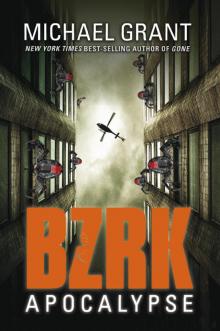 BZRK: Apocalypse
BZRK: Apocalypse Bzrk
Bzrk Love Sucks and Then You Die
Love Sucks and Then You Die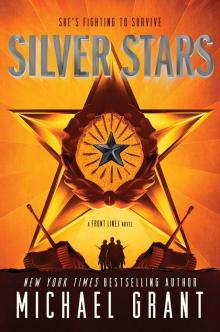 Silver Stars
Silver Stars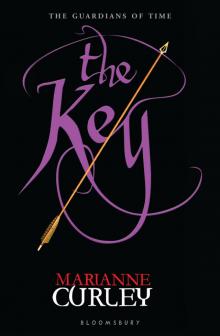 The Key
The Key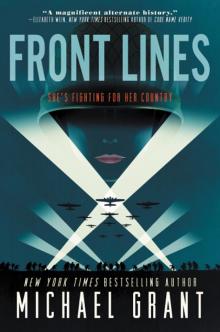 Front Lines
Front Lines BZRK Origins
BZRK Origins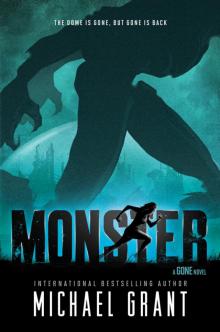 Monster
Monster Gone
Gone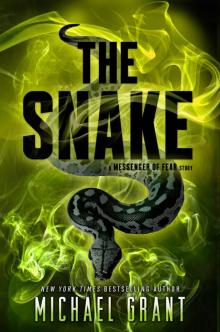 The Snake
The Snake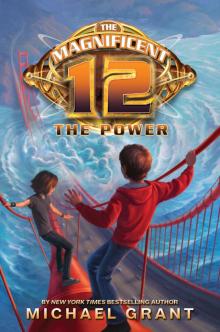 The Power
The Power Hunger
Hunger Lies
Lies A Sudden Death in Cyprus
A Sudden Death in Cyprus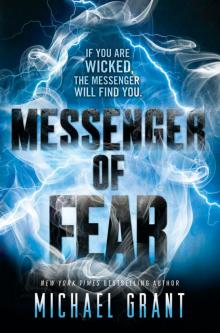 Messenger of Fear
Messenger of Fear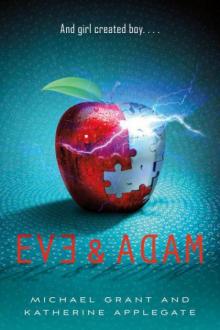 Eve & Adam
Eve & Adam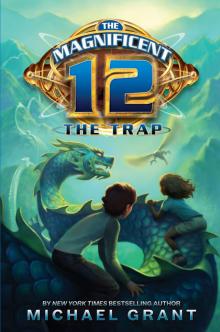 The Trap
The Trap Light
Light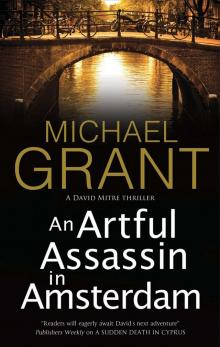 An Artful Assassin in Amsterdam
An Artful Assassin in Amsterdam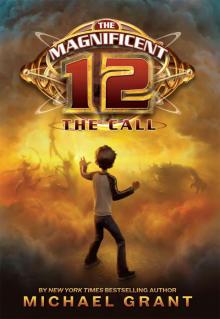 The Call
The Call Hero
Hero Soldier Girls in Action
Soldier Girls in Action Purple Hearts
Purple Hearts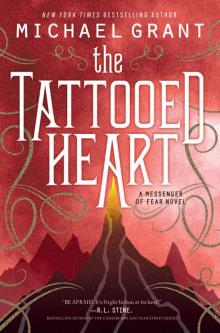 The Tattooed Heart
The Tattooed Heart The Fall of the Roman Empire
The Fall of the Roman Empire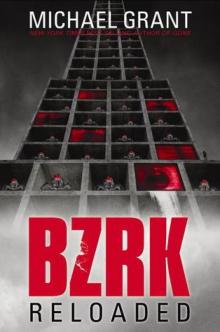 BZRK Reloaded
BZRK Reloaded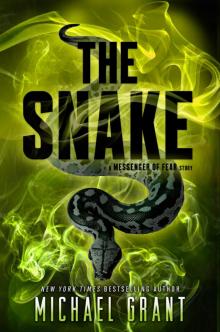 Messenger of Fear Novella #1
Messenger of Fear Novella #1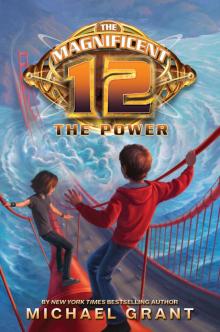 The Magnificent 12
The Magnificent 12 Fear: A Gone Novel
Fear: A Gone Novel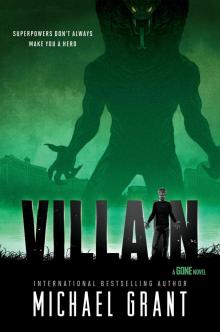 Villain
Villain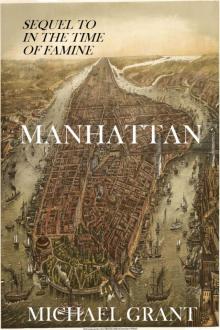 Manhattan
Manhattan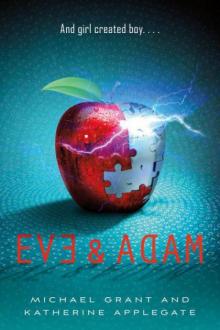 Eve and Adam
Eve and Adam Plague: A Gone Novel
Plague: A Gone Novel Fergie Rises
Fergie Rises In the Time of Famine
In the Time of Famine Hunger_A Gone Novel
Hunger_A Gone Novel Lies g-3
Lies g-3